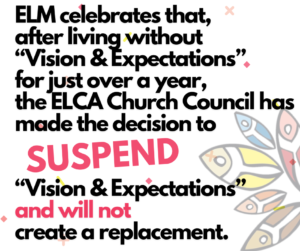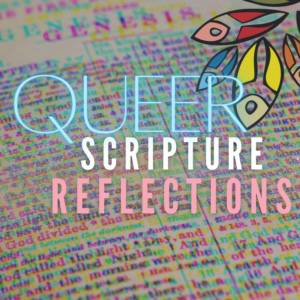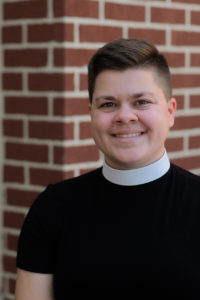The year 1990 brought us the creation of the World Wide Web, the launch of the Hubble telescope, the release of Nelson Mandela after 27 years in prison, and it was also the year of the reunification of Germany when the Berlin Wall came down. 1990 was also the year when the wall known as “Vision & Expectations” was built into the newly created Evangelical Lutheran Church in America’s candidacy process barring publicly-out LGBTQIA+ individuals from serving the church. Over 31 years later, we celebrate, this wall, too, has finally come down.
Earlier this month, the ELCA Church Council “suspended consideration of an aspirational document to replace ‘Vision and Expectations’ until the need arises to develop such a document” ending an almost three-year review process.
“I thank God that V&E is gone!” Pastor Christina Montgomery (she/her) proclaimed when she heard the news. “That singular document forced so many brilliant LGBTQIA+ people to choose between answering God’s call to ministry and living their authentic embodied truth as God created them. It is my prayer that the ELCA continues to leap forward in its understanding of the gospel and reflect the radically inclusive love of Christ in all of its governing documents.”
 ELM celebrates that, after living without “Vision & Expectations” for just over a year, the ELCA Church Council has made the decision to suspend “Vision & Expectations” and will not create a replacement (see background section below).
ELM celebrates that, after living without “Vision & Expectations” for just over a year, the ELCA Church Council has made the decision to suspend “Vision & Expectations” and will not create a replacement (see background section below).
“We are ever closer to a time when queer leaders can enter into candidacy as the called and faithful servants that God created them to be without having to justify — to themselves or candidacy committees — that their sexual and gender identities are holy and are gifts for ministry in this Church,” commented ELM Executive Director, the Rev. Amanda Gerken-Nelson (she/her). “Removing ‘Vision & Expectations’ is a monumental moment for our community.”
It is important to acknowledge that there continue to be pillars of discrimination and barriers to full-participation that permeate our Church — for example, “Bound Conscience” in the 2009 human sexuality statement “Gift & Trust.” White supremacy, trans- and queer-phobia, and ableism continue to plague our communities and congregations. While ELM believes progress has been made, we also fear that the church could slide backward on the arc of justice if the “need…to develop such a (new) document” is determined solely by those who have historically held positions of power and privilege in the Church.
ELM will continue to advocate in ELCA rooms of power for the most marginalized in our midst — just as it did for the abolishment of “Vision & Expectations.” There is still a great amount of ministry yet to do!
For thousands of years, the church has obsessively created rules regarding human sexuality and leaders have argued against them. Martin Luther, himself, called clerical celibacy “devilish tyranny” and broke with the Roman Catholic church’s own vision & expectations when he married a woman. Our bodies and the way we express sexual intimacy with loving partners are areas the big Church does not model well, nor has it ever. However, ELM is committed to advocating for all sexual expressions & identities in our church while breaking down walls of injustice, flipping the tables of racial inequality & oppression, while continuing to serve as a resource for all its queer ministry leaders.
Background:
Vision & Expectations was created in response to four seminarians (the Berkeley Four) who came out publicly as gay to their candidacy committees in 1987. The newly formed ELCA Church Council approved a document in 1990 that declared that ministers who were “homosexual in their self-understanding” were expected to “abstain from homosexual sexual relationships” (see former ELM Executive Director, Amalia Vagts, article “A Short History of Vision & Expectations”). Though V&E was amended in 2009, following the adoption of the ELCA social statement “Sexuality: Gift & Trust,” to allow persons in same-gender “publicly accountable, lifelong, monogamous” relationships to serve in leadership roles of the church, its role in the candidacy process ultimately continued to discriminate against queer ministry leaders.
In the fall of 2018, members of the Conference of Bishops along with ELCA staff began the process of revising V&E to reflect the then nation-wide right for same-gender couples to be legally married and the unification of the Word & Service roster resulting in a revision that included a name change to “Trustworthy Servants of the People of God” (see ELM’s public response). ELM organized Proclaim members and partnered with ministries partners, like ReconcilingWorks and the Ethnic-Specific Ministries of the ELCA, to rebuke this revision and in March 2019, the ELCA Church Council declined to consider “Trustworthy Servants” and referred the document to the ELCA Domestic Mission unit for further review and redrafting.
ELM’s Executive Director, the Rev. Amanda Gerken-Nelson (she/her), served on a listening group along with the President of the African Descent Lutheran Association, the Rev. Lamont Wells (he/him), and other committee members representing concerned constituencies: deacons, seminaries, Bishops, a safe church specialist, ELCA candidacy staff and Church Council members. With the guidance of this group, the Domestic Mission Executive, the Rev. Phil Hirsch (he/him), investigated the purpose and need for a document like “Vision & Expectations” including a nation-wide survey on “What does the Church need?” and listening sessions at the Proclaim 2019 Gathering and Churchwide Assembly. This work produced the recommendation in March 2020 to suspend “Vision & Expectations” entirely until a new document could be drafted. This recommendation was approved by both the Conference of Bishops and the Church Council.
In November 2021, after living and welcoming individuals to the candidacy process without V&E as a gatekeeper for just over a year, Rev. Hirsch recommended to the Conference of Bishops and the ELCA Church Council to “[suspend] consideration of an aspirational document to replace ‘Vision and Expectations’ until the need arises to develop such a document.” This was approved at the Church Council’s November 2021 meeting.

.png)
 Rev. Kevin O’Hara (he/him) is the pastor of Emanuel Lutheran Church in Pleasantville, New York. He has served as conference dean, chair of a local campus ministry, and on various synod committees. He enjoys reading, gardening, and playing with his cats and turtles (yes, turtles play!).
Rev. Kevin O’Hara (he/him) is the pastor of Emanuel Lutheran Church in Pleasantville, New York. He has served as conference dean, chair of a local campus ministry, and on various synod committees. He enjoys reading, gardening, and playing with his cats and turtles (yes, turtles play!).
 Bridget
Bridget